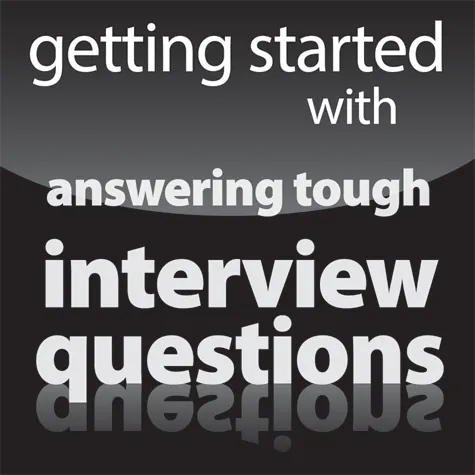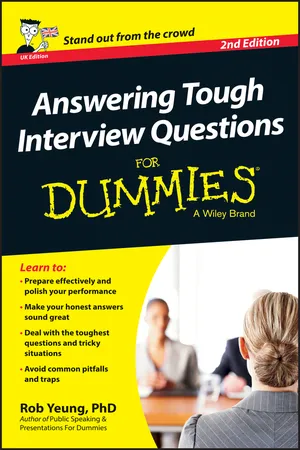Chapter 1
Understanding the Interviewing Game
In This Chapter
Realising what interviewers want from job candidates
Understanding the skills and qualities sought by employers
The job market is increasingly competitive, and many interviewers are inundated with too many applications. In this chapter, I share with you the secrets of what interviewers are really looking for, and how to prepare the ammunition for your answers.
This book contains plenty of advice and loads of mock answers to tough interview questions. But simply reading through the book won't get you anywhere. What you need to do is figure out how
you would answer different interview questions by using my answers for inspiration.
Recognising What Interviewers Are Looking For
At first glance, different job adverts seem to require a dazzling array of skills, experience and qualities. But in actuality, most employers are really looking for four basic factors to find the right person for the job. These four factors can be summarised as the four Cs of interviews:
- Competence: Interviewers look to recruit people who have the skills and personal qualities to do the job with minimal supervision.
- Confidence: Employers want to hire people who are at least reasonably composed and secure about themselves. They want people who can deal with new people and new situations without turning into a trembling wreck!
- Commitment: Interviewers want to give the job to someone who sticks at it. They want a self-motivated person who persists in the face of difficulties rather than gives up at the first sign of trouble.
- Chemistry: Interviewers want someone that they feel they can get on with. All employers feel they have a unique culture – and want to know that you can fit in with the rest of the team.
Demonstrate your competence and commitment by giving good answers to the many questions thrown at you. You can demonstrate confidence and create chemistry by using your tone of voice and body language to show that you're the kind of collected and likeable person who gets on with everyone. Be aware that the interviewers are not only evaluating what you say, but also how you say it. No matter what section of the book you turn to, be sure to keep the four Cs in mind.
Finding Out about Key Skills and Qualities
When interviewers say they're looking for ‘competent’ candidates, what exactly do they mean? Well, dozens of surveys have asked employers what they want from potential recruits. This section covers the top ten skills and personal qualities that employers look for. Parts II and III take you through how to answer these questions, but for now, make a mental note of these skills and then weigh up whether you possess them.
Interestingly, most of the surveys agree that these skills and characteristics tend to apply to employees at all levels of an organisation and across most industry sectors. So a high-street retailer looking for a shop assistant tends to want more or less the same skills and qualities as an international corporation looking for a senior manager – although obviously to differing degrees.
Communicating with people
Unless you are being hired to work in a sealed room with no contact with colleagues or customers (which I very much doubt!), you need to have good communication skills.
When discussing your communication skills with interviewers, think of examples of occasions when you:
- Listened to the needs of other people, such as colleagues or customers.
- Conveyed information to other people – perhaps speaking on a one-to-one basis or presenting to a group of people.
- Handled difficult situations, such as customer complaints, on the telephone.
- Used your written communication skills in preparing reports or documents for other people to read.
See Chapter 3 for more about communication skills.
Influencing others
Although communication skills are important, most employers want people who also have powers of persuasion – being able to win others over or change their minds. In preparing for your interviews, think of times when you have:
- Had a discussion with someone and helped him or her to see your point of view.
- Changed someone's mind.
- Persuaded someone to take a course of action that they were initially not in support of.
Persuasion skills are particularly prized when dealing with customers or clients – for example, in listening to their needs and then selling products or services to them.
See Chapters 4, 5 and 9 for more on influencing skills.
Analysing situations
Managers want to hire candidates who can research issues and assess situations. Make sure that you think about times when you:
- Gathered information about a topic or issue.
- Broke down a complex problem into a number of smaller issues.
- Weighed up the pros and cons of different options.
See Chapters 9 and 12 for more about analytical skills.
Solving problems and making decisions
Employers are looking for people who can assess situations and then work out the best course of action to take. Be ready to talk to interviewers about occasions when you:
- Made suggestions about how to tackle a problem.
- Initiated or participated in brainstorming sessions.
- Weighed up different options and chose a course of action to solve a problem or tackle an issue.
See Chapters 9 and 12 for more about problem-solving skills.
Demonstrating drive and determination
Organisations do not want to hire people who only work when given explicit instructions as to what to do; they want to hire candidates who are self-motivated and can demonstrate a bit of initiative. Think back to times when you:
- Suffered a setback or disappointment at work but got back on your feet and got on with a task.
- Had an original idea and used it to be more effective or productive at work.
- Overcame a difficulty or obstacle that was preventing you from achieving a goal.
Chapters 4, 5 and 9 contain more information on demonstrating drive and determination.
Teamworking with colleagues
Employers are constantly talking about the need for employees to work together more effectively as a team. Try to recall instances when you:
- Helped someone else in the team with their work or duties.
- Resolved conflict or disagreement between other team members.
- Provided a team member with ...





